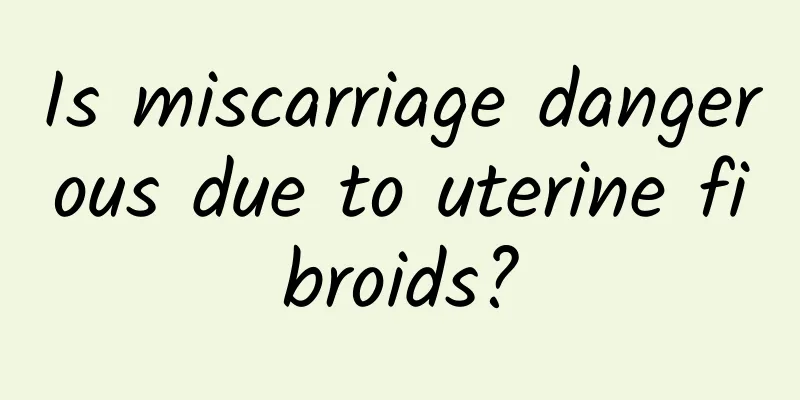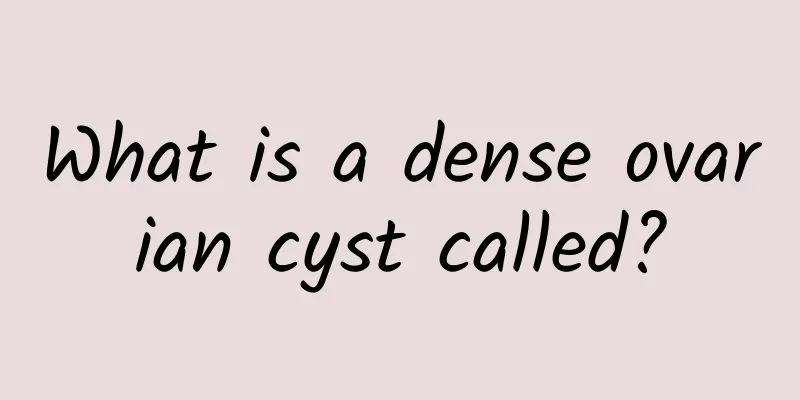Is miscarriage dangerous due to uterine fibroids?

|
Uterine fibroids are one of the most common benign tumors in the female reproductive organs and one of the most common tumors in the human body. They are also called fibroids and uterine fibroids. Because uterine fibroids are mainly formed by the proliferation of uterine smooth muscle cells, with a small amount of fibrous connective tissue as supporting tissue, they are called uterine leiomyoma, or uterine fibroids for short. Most patients with uterine fibroids have no obvious symptoms and are only occasionally found during pelvic or ultrasound examinations. If there are symptoms, they are closely related to the growth site, speed, degeneration and complications of the fibroids, and are closely related to the size and number of the fibroids. People with multiple subserosal fibroids may have no symptoms, while smaller submucosal fibroids often cause irregular vaginal bleeding or menorrhagia. Common symptoms include uterine bleeding, abdominal mass and compression symptoms, and pain. Usually uterine fibroids do not cause pain, but many patients may complain of lower abdominal swelling and back pain. When the pedicle of a subserosal fibroid is twisted or the uterine fibroid undergoes red degeneration, acute abdominal pain may occur. Endometriosis or adenomyosis is not uncommon, and dysmenorrhea may occur. Increased leucorrhea Increased uterine cavity, increased endometrial glands, and pelvic congestion can increase leucorrhea. When ulcers, infections, and necrosis occur in the uterus or cervical submucosal fibroids, bloody or purulent leucorrhea will occur. Most patients with uterine fibroids have no obvious symptoms and are only occasionally found during pelvic or ultrasound examinations. If there are symptoms, they are closely related to the growth site, speed, degeneration and complications of the fibroids, and are closely related to the size and number of the fibroids. People with multiple subserosal fibroids may have no symptoms, while smaller submucosal fibroids often cause irregular vaginal bleeding or menorrhagia. Common symptoms include uterine bleeding, abdominal mass and compression symptoms, and pain. Usually uterine fibroids do not cause pain, but many patients may complain of lower abdominal swelling and back pain. When the pedicle of a subserosal fibroid is twisted or the uterine fibroid undergoes red degeneration, acute abdominal pain may occur. Endometriosis or adenomyosis is not uncommon, and dysmenorrhea may occur. Increased leucorrhea Increased uterine cavity, increased endometrial glands, and pelvic congestion can increase leucorrhea. When ulcers, infections, and necrosis occur in the uterus or cervical submucosal fibroids, bloody or purulent leucorrhea will occur. Uterine fibroids are a common benign tumor that usually has little effect on the body, but if the tumor is relatively large, it may cause symptoms such as vaginal bleeding and abdominal pain. Uterine fibroids have little effect on miscarriage and the risk is not high. Don't worry too much. Just pay attention to daily care and don't be careless. You should closely observe your physical condition and have regular checkups. If you find that uterine fibroids have a serious impact on your body, you should have surgery in time. |
<<: How to judge ovulation bleeding and what should you pay attention to?
>>: What causes uterine fibroids?
Recommend
How to regulate irregular menstruation
How to regulate irregular menstruation? Menstruat...
Why is there always blood after menstruation?
Why is there always blood after menstruation? It ...
Does bacterial vaginosis affect fetal development?
Will bacterial vaginosis affect fetal development...
What should I put in chicken soup with uterine fibroids? Can patients with uterine fibroids drink chicken soup?
Women with uterine fibroids should pay special at...
Do multiple uterine fibroids require surgery? Treatment methods for multiple uterine fibroids
Multiple uterine fibroids can cause women's o...
Can a woman with cervical precancerous lesions in late pregnancy give birth naturally?
Can a woman with cervical precancerous lesions in...
Do you know the early symptoms of vulvar leukoplakia?
Do you know the early symptoms of vulvar leukopla...
Get rid of fat and sugary drinks! 6 slimming drinks to beat the heat
In the hot summer, many women drink sugary drinks...
What tests are needed for fallopian tube tuberculosis
The diagnosis of fallopian tube tuberculosis requ...
What are the effective care measures for pelvic inflammatory disease?
How to take good care of pelvic inflammatory dise...
Mid-Autumn Festival reunion is not a happy one~ Beware of the four high-calorie mines during the Mid-Autumn Festival
Mid-Autumn Festival is an important traditional f...
What is the best way to treat adenomyosis at the age of 49?
There is no such thing as the best way to treat a...
Patients with cervical erosion must understand the examination methods in time
The appearance of cervical erosion will have a ce...
Patients with pelvic inflammatory disease should know some examination methods
The frequent occurrence of pelvic inflammatory di...
What medicine is effective for irregular menstruation?
What medicine is effective for irregular menstrua...









